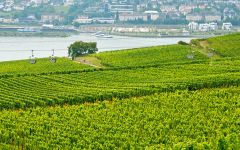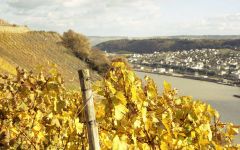Josef Leitz Rudesheimer Magdalenenkreuz Riesling Spatlese 2002
-
Wine
Spectator



Product Details
Your Rating
Somm Note
Winemaker Notes
Number 81 on Wine Spectator Top 100 Wines of 2004!
The exotic flair of this Riesling is composed from the aroma of lemons and limes, slight mint echoes, as well as a touch of lychee, tarragon, banana, pear and pineapple. Everything is awash with a vigorous residual sweetness and this, combined with a delicate fruity acidity, allows the flavors to melt beautifully slowly on the palate. The Magdalenenkreuz is a refreshing wine, which makes the water run in your mouth. Perfect for Asian cuisine, and to accompany everything that is fruity, sweet and sour, hot and intensively seasoned with chili, star aniseed, coriander, ginger, soy sauce and sesame oil. Magnificent with apple strudel and custard.
Professional Ratings
-
Wine Spectator
A tantalizing mix of apricot, orange, rose and mineral meshed in a creamy texture, all backed by vibrant acidity. Concentrated and long, with a crispness at the end that will become integrated with time.






Under the direction of Johannes Leitz, Weingut Josef Leitz has earned the reputation of being one of Rheingau’s top growers and moreover, one of the finest producers in Germany. Since taking over his family estate in 1985, Johannes has grown his holdings from 2.6 hectares to over 40, most of which are Grand Cru sites on the slopes of the Rüdesheimer Berg. Once the home of some of the world’s most sought after and expensive wines, the region fell to mediocrity in the years following the Second World War. Josi has made it his life’s work to reclaim the intrinsic quality of his native terroir and introduce the world to the true potential of the Rheingau.
The Rheingau is a small region, stretching only 20 miles from east to west. It is marked by a course change in the Rhein River’s flow to the North Sea from its origins in the Swiss Alps. As the Rhein flows north along the eastern edge of the Pfalz and Rheinhessen, it runs directly into the Taunus Mountain range which has a subsoil comprised of pure crystalline quartzite. Rivers, no matter how mighty, are lazy and the Rhine has yet to break through the quartz infrastructure surrounding the town of Mainz. At Mainz, the Rhein turns west and the 30 km stretch between Mainz and Rüdesheim makes up the majority of the Rheingau. Even though the region is further north than the middle Mosel, its south facing slopes get hotter than the narrow Mosel Valley which therefore provides important diurnal temperature variation.
Leitz’s estate vineyards lie entirely on the westernmost part of the Rheingau on the Rüdesheimer Berg—a steep, south-facing hillside of extremely old slate and quartzite—planted entirely to riesling, encompassing the Grand Crus of Schlossberg, Rottland, and Roseneck. Leitz trains his vines in a single-cane, cordon system to improve the quality and character of the fruit, differing from the majority of Rheingau growers where the practice has long been to prioritize yield via a double-cane system. Johannes is a firm believer that the crucial work of the vigneron takes place in the vineyards. Focused on farming as sustainably as possible and working by hand, the grueling hours of labor on the ultra-steep slopes allow these ancient vineyards to reach their maximum potential.

Riesling possesses a remarkable ability to reflect the character of wherever it is grown while still maintaining its identity. A regal variety of incredible purity and precision, this versatile grape can be just as enjoyable dry or sweet, young or old, still or sparkling and can age longer than nearly any other white variety. Somm Secret—Given how difficult it is to discern the level of sweetness in a Riesling from the label, here are some clues to find the dry ones. First, look for the world “trocken.” (“Halbtrocken” or “feinherb” mean off-dry.) Also a higher abv usually indicates a drier Riesling.

Following the Mosel River as it slithers and weaves dramatically through the Eifel Mountains in Germany’s far west, the Mosel wine region is considered by many as the source of the world’s finest and longest-lived Rieslings.
Mosel’s unique and unsurpassed combination of geography, geology and climate all combine together to make this true. Many of the Mosel’s best vineyard sites are on the steep south or southwest facing slopes, where vines receive up to ten times more sunlight, a very desirable condition in this cold climate region. Given how many twists and turns the Mosel River makes, it is not had to find a vineyard with this exposure. In fact, the Mosel’s breathtakingly steep slopes of rocky, slate-based soils straddle the riverbanks along its entire length. These rocky slate soils, as well as the river, retain and reflect heat back to the vineyards, a phenomenon that aids in the complete ripening of its grapes.
Riesling is by far the most important and prestigious grape of the Mosel, grown on approximately 60% of the region’s vineyard land—typically on the desirable sites that provide the best combination of sunlight, soil type and altitude. The best Mosel Rieslings—dry or sweet—express marked acidity, low alcohol, great purity and intensity with aromas and flavors of wet slate, citrus and stone fruit. With age, the wine’s color will become more golden and pleasing aromas of honey, dried apricot and sometimes petrol develop.
Other varieties planted in the Mosel include Müller-Thurgau, Spätburgunder (Pinot Noir) and Weissburgunder (Pinot Blanc), all performing quite well here.
